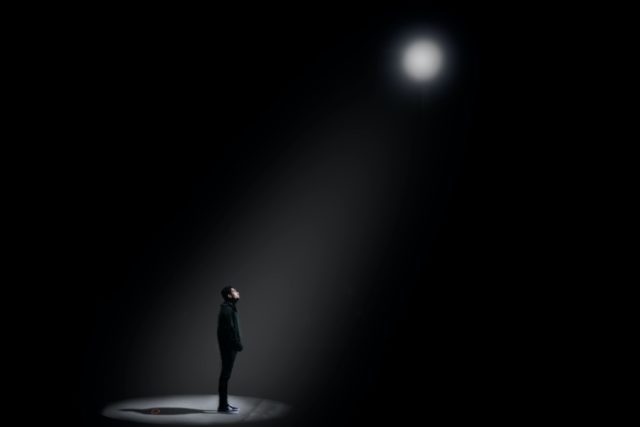Unplugging the Social Anxiety Spotlight
By: Other | September 23, 2022

Written by Stephanie Salo, Psy.D.
If you dread social situations because you worry about being perceived as “weird,” or if you feel awkward around new people or in groups, you are likely experiencing the immobilizing effect of social anxiety. Although it is common to feel some nervousness in social settings (especially during re-entry in the COVID-19 era), the physiological impacts are more pronounced for those who experience clinical social anxiety. Imagining that all eyes are on you, a surge of anxiety symptoms explode, such as a pounding heart, increased body temperature, a flushed face, loss of concentration, excessive perspiration, and intrusive, negative thoughts as shame permeates your whole being. A sudden urge to hide overcomes you, but it seems as though there is a spotlight tracking your every move, highlighting each flaw and mistake.
Under the Spotlight
The spotlight effect is a term social psychologists use to describe this phenomenon, in which people tend to overestimate how much attention others are paying to them. The truth is, other people very rarely focus on you. If they do, their thoughts are either neutral or kinder than you likely imagine. In fact, psychological research has demonstrated that other people are worried about YOU looking at and judging THEM as they feel caught in their own spotlight.
Origins of Social Anxiety
In more primitive times, being an “other” was likely dangerous, meaning that acceptance by a new group was a matter of survival. These instincts persist and influence why we feel so uncomfortable in social situations, especially if we are singled out. It can become even worse in front of strangers or if we are the focus of attention of many others, such as public speaking (which is the most common phobia, called glossophobia, shared by approximately 77% of the U.S. population).
Social anxiety and anxiety-related concerns usually originate in childhood. For example, you may have had others laugh at your mistake or you may have been teased for being different. Unfortunately, you are in pre-set social situations as a kid, such as in your neighborhood, at school, on the bus, and in extracurricular activities, in which you don’t have a lot of choice. This creates a conflict from which anxiety arises; there is some perceived “danger” (likely embarrassment or being ostracized) from which you cannot easily escape (without getting in trouble) which causes discomfort. When this happens, you likely blame yourself and feel as though something is wrong with you.
Fortunately, you can learn how to manage social anxiety by directing your attention outward and realizing how little others are focused on you.
Overcoming the Spotlight Effect
Realize there is no spotlight. It’s imagined. Remember that most people are walking around believing that others are judging their flaws, too! As such, they rarely look up to notice (or criticize) yours.
Look around to gather evidence and see if others are actually watching you. If not, notice what they are looking at or see what they are doing. You might be surprised (and relieved) at how little attention or judgment people are giving you.
Anxiety is your body’s signal that you are in danger. In most social situations, you are not likely to be in any real danger. (If you are, being aware of your surroundings is very important!) When anxious, you likely hold your breath which sends a message to your brain that you are hiding from a predator or enemy. By engaging in deep exhaling while reminding yourself that you are not in danger, you signal to the fear center of your brain that you are physically safe. This will tell your autonomic nervous system that you don’t need to go into fight/flight/freeze mode.
If someone makes eye contact with you, consider smiling and saying hello to see what happens. Usually, people will smile back. Notice how you feel inside. Often a sense of warmth or excitement can come from a simple gesture of connection. To get a conversation started, comment on what you like about them or mention something you both have in common. Perhaps this interaction will lead to a new friendship.
We all have eccentricities—it makes us interesting! If you can appreciate (and celebrate) the aspects that might be different about you, then you are more likely to connect with a community of like-minded folks who appreciate and value you and any unique qualities.
Being aware of the spotlight effect can increase comfort when making a first impression. Unplug that imagined spotlight and observe your surroundings. You can reduce social anxiety by noticing that everyone is NOT looking at or criticizing you. Remember that you are generally safe, which can help you stay calm and engage better with others in social settings.
Clinical social anxiety is best treated with action-oriented therapy techniques, such as Cognitive Behavioral Therapy (CBT) to help you correct your negative thought patterns and unhelpful behaviors. Contact Us today to learn more about how a trained and compassionate member of the Therapy Changes team can help you work through your specific set of circumstances to overcome social anxiety.
Photo by Matthew Menendez on Unsplash



